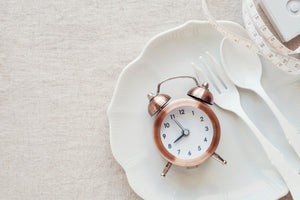Coffee is one of the world's most commonly consumed beverages, with around 2 billion cups enjoyed per day. It’s the rich flavor and energy-boosting qualities that make this drink so well-loved.
You might be wondering if there is a best time to enjoy that cup of joe for optimal benefits.
Keep reading to learn more about the science behind coffee's energy-boosting and mood-enhancing effects and whether there is an ideal time to consume coffee depending on the goal, from improved performance to better sleep.

Why Does Coffee Increase Energy?
Coffee's energizing effects are primarily attributed to its caffeine content.
Caffeine is a natural stimulant that works by blocking the action of adenosine, a neurotransmitter responsible for promoting sleep and relaxation.
When adenosine's effects are reduced, you experience increased alertness and wakefulness, resulting in a perceived boost in energy.
How Does Coffee Boost Mood?
In addition to its energy-boosting abilities, studies show that coffee may also enhance mood.
Caffeine stimulates the release of certain neurotransmitters, such as dopamine and norepinephrine, which play key roles in mood regulation.
As a result, coffee consumption can lead to improved mood, increased focus, and a sense of well-being.

Is Coffee Healthy?
Coffee can be consumed as part of a healthy lifestyle. It has several bioactive compounds, such as antioxidants, which have been linked to potential health benefits.
These benefits include a reduced risk of certain diseases like type 2 diabetes, Parkinson's disease, and Alzheimer's disease.
Like with anything, too much of a good thing can be a bad thing. Excessive coffee consumption may lead to unpleasant side effects such as anxiety, insomnia, and digestive discomfort.
Who Should Avoid Coffee?
While coffee can offer many advantages, it's not suitable for everyone.
Pregnant women should limit their caffeine intake to less than 200 mg per day.
Consuming too much caffeine during pregnancy can potentially lead to complications. We recommend talking to your healthcare provider to determine the amount that's right for you.
Individuals with heart arrhythmias, ulcers, or severe anxiety disorders should speak with a healthcare professional before drinking coffee due to potential interactions and worsening of symptoms.
Some people are highly sensitive to caffeine and may experience adverse effects like palpitations, nervousness, or sleep disturbances even with moderate consumption.

When to Drink Coffee for Best Results?
The timing of when you drink your coffee may impact the results you experience. Here are some optimal times to enjoy your coffee depending on your goals:
1. Morning: Wake Up and Energize
Drinking coffee first thing in the morning is an obvious choice.
It can help kickstart your day by increasing alertness and providing a much-needed energy boost. It's an excellent way to combat morning grogginess and jumpstart your productivity.
2. Mid-Morning: Maintain Focus
For those who experience a mid-morning slump, a cup of coffee can help maintain focus and productivity. The caffeine can help keep you dialed in until lunchtime.
3. Before a Workout: Enhance Performance
Drinking coffee before a workout can increase energy and strength, plus improve physical performance and stamina.
Caffeine increases adrenaline production, which may lead to better endurance. It also increases fatty acid oxidation which may increase fat-burning during exercise.
If you exercise in the late afternoon or evening, drinking coffee before your workout might interfere with your sleep, so opt for a stimulant-free pre-workout instead.

When to Stop Coffee for Optimal Sleep
While coffee can be a dependable ally in the morning and early afternoon, it's important to know when to have your last cup to ensure a good night's sleep.
To promote better sleep, consider avoiding coffee in the late afternoon or evening. Consuming coffee too late in the day can interfere with your ability to fall asleep and stay asleep. Aim to finish your last cup of coffee at least 6 hours before bedtime.
If you're sensitive to caffeine or have difficulty sleeping, it's wise to limit your daily caffeine intake and have your last caffeinated beverage even earlier in the day.
If you enjoy the taste of coffee but want to avoid the stimulating effects of caffeine before bedtime, consider decaffeinated coffee. While decaf coffee does contain some caffeine, it has significantly less than its regular counterpart.
Conclusion
The best time to drink coffee depends on your individual preferences and lifestyle. Coffee can be a great way to increase energy, enhance mood, and improve physical performance when consumed responsibly.
Be mindful of the potential downsides of drinking too much caffeine and adjust your coffee intake accordingly to suit your needs and goals. Whether it's to kickstart your morning, maintain focus during the day, or enhance your workout, coffee can be a versatile and enjoyable part of your daily routine.








